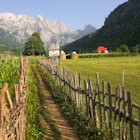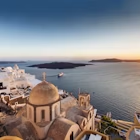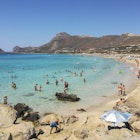
YouвҖҷve probably never been to Thessaloniki, Greece. HereвҖҷs why you should go

Feb 1, 2024 вҖў 7 min read

Many travelers to Greece never make it to charming Thessaloniki. We advise against that В© Aivita Arika / Shutterstock
Often eclipsed by Athens, Thessaloniki вҖ“ GreeceвҖҷs second-largest city вҖ“ shouldnвҖҷt be overlooked.
This student metropolis has a relaxed vibe and great nightlife, ancient sites, fabulous food and nearby wineries that will give anyone plenty to explore for a weekend break or longer, all year round. Is Thessaloniki good for tourists? Resoundingly, yes.
Here are some top travel tips for Thessaloniki, the city by the sea.

A culinary crossroads
Gastronomy lovers wonвҖҷt be disappointed in Thessaloniki, which was awarded prestigious City of Gastronomy status by UNESCO in 2021 in recognition of the many cultures that have influenced the dishes of the region over the years. This fusion of Ottoman, Balkan and Mediterranean traditions results in such specialities as bougatsa, a popular cream pastry first brought to the city by refugees from Asia Minor in the 1920s.
Be sure to sample Greek coffee and local street food such as koulouri, a sesame bread ring popular all over Greece that supposedly originated with refugees in Thessaloniki. As you sample traditional handmade foods вҖ“ pumpkin-and-leek pies, cheeses made from sheep and goats milk, cured meats, olives and extra-virgin olive oil, and traditional delicacies such as small fish mezes вҖ“ youвҖҷll understand the regionвҖҷs diversity through its food. Centrally located Kapani Market, the cityвҖҷs oldest, is a one-stop shop for tasting a range of fish and meat, fruit and vegetables, sweets, nuts, spices and more. A gastronomy tour offered by local outfit is a great way to combine top flavors while learning more about the historical center of the city.

A compact city for strolling
Compact Thessaloniki is a pleasure to walk around, its waterfront never more than a 15-minute stroll from the city center. This scale makes it easy to delve into the cityвҖҷs history and architectural wonders. The cityвҖҷs landmark 34m (111ft)-high White Tower served as a prison and place of execution during Ottoman times. Today, itвҖҷs the anchor of the New Waterfront, a modern promenade that offers views across the bay to Mt Olympus.
ThereвҖҷs no shortage of archaeological wonders here, either. The 7th-century Church of Agios Dimitrios honors ThessalonikiвҖҷs patron saint (his remains are interred in the crypt underneath the church). Taking after the famous Hagia Sophia in Istanbul, the even earlier (6th-century) Agia Sofia blends Roman and Byzantine architectural traditions, and is covered with stunning gold leaf that glows in the candlelight.
Have a coffee break in Aristotelous Sq, where the statue of the ancient philosopher stands proud. Then head up to the historic neighborhood of Ano Poli (Upper Town), with its narrow cobbled alleyways protected by the remaining walls of the Byzantine and Ottoman fortress. While itвҖҷs a long walk up, phenomenal views down to the main lower city and sea are the reward. (We recommend taking a taxi up, then walking down.)
Back in the new city, learn even more about ThessalonikiвҖҷs past. The Archaeological Museum documents MacedoniaвҖҷs prehistory, as well as the Hellenistic and Roman periods, while the Museum of Byzantine Culture showcases more than 3000 Byzantine objects. offers free walking tours with local guides.

Go wine tasting at family-run wineries
A few kilometers outside the city lies , a family-owned winery spread over 118 acres, that has produced wine since 1981. Visitors love sampling the whites, reds and rosГ©s here, and taking in the small on-site museum, with its displays of viticulture, wine-making and bottling tools from around the world, collected by the family since 1976.
For a taste of single-grape spirits made from hand-harvested, organic grapes, head to the , a half-hourвҖҷs drive from Ktima Gerovassiliou. Both family-run businesses continue regional traditions, in a beautiful area with views of both the sea and snow-capped Mt Olympus.

Delve into the areaвҖҷs вҖңgreatвҖқ past
If youвҖҷre interested in ancient Greek history and archaeology, head for a small village about an hour from Thessaloniki. Vergina is where youвҖҷll find the UNESCO-protected archaeological site of the Royal Tombs of Aigai, its main tomb the burial chamber of Philip II, father of Alexander the Great. ItвҖҷs one of the most important historical sites in Northern Greece.
Descend through the tunnel under the burial mound to see the tomb door. On display in the surrounding museum are silver chalices, an ivory-and-gold shield, a gold-plated quiver, a full suit of gilded armor and countless other treasures found buried with the king.
A short distance away lies the larger , which exhibits objects from Alexander the GreatвҖҷs period. ItвҖҷs the main highlight of the restored part of MacedonвҖҷs вҖ“ which, in its day, was three times bigger than the Parthenon. You won't find this Alexander the GreatвҖ“related history anywhere else in Greece.
To visit Vergina (as well as the wineries), itвҖҷs best to rent your own car if you prefer to tour on your own. But consider a to fully understand the majesty of what youвҖҷre experiencing. can help with both.
Enjoy art on the waterfront
Back in Thessaloniki, head to Pier A along the port to the and the Experimental Center for the Arts, both atmospheric locations for looking at art. Both mount photography exhibits on social and political themes, with works by international artists that change every three months or so. The two are part of the Metropolitan Organisation of Museums of Visual Arts () network вҖ“ as is the , a nine-minute walk from the White Tower.
Back at the pierвҖҷs entrance, treat yourself to a coffee at the Maritime Cafe and Cocktail Bar. Whether youвҖҷre sitting inside or out, you can soak in the lively waterfront ambiance and look out to Mt Olympus in the distance.

Where to eat in Thessaloniki
YouвҖҷll be spoiled for choice with restaurants and tavernas here. Ladadika, the old district to the west of the port filled with cobbled streets and neoclassical buildings, is ThessalonikiвҖҷs nightlife area. YouвҖҷll find coffee shops and bars galore frequented by the students, plus several restaurants to choose from.
In the heart of Ladadika, is a good local choice, with staples such as moussaka and wine served in jugs to a soundtrack of live music. The more upmarket serves dishes that suit meat lovers, vegetarians and vegans alike. (The tarama fish roe dip is to die for.) In the heart of the city, is popular with the business crowd; donвҖҷt leave without trying the delicious focaccia bread dripping with chili butter and hot honey.
at the On Residence Hotel combines deluxe gastronomy with down-to-earth, вҖңpassed down from grandmaвҖқвҖ“style recipes. The award-winning Greek chef here serves up dishes such as moussaka with bГ©chamel sauce on the side. We recommend being adventurous and leaving the choice of dish to your server, for a pleasant surprise.

Where to stay in Thessaloniki
Wherever you stay in central Thessaloniki, you wonвҖҷt be far from the promenade or main sights. Hotel choices range from five-stars such as the renovated, historic along the promenade, which has Mt Olympus views and is perfect for a romantic break. More down to earth but still central, the is close to shopping streets and the main sights.
If youвҖҷre planning on staying longer, occupies a former factory that once produced traditional pots and the famous briki used to brew Greek coffee; today, the building houses 25 self-catering apartments in a local neighborhood. This is a great choice for independent travelers looking to be in the thick of local life, yet only a 15-minute walk to the seafront.

How to get to Thessaloniki
Flights from Athens take around 35 minutes, and the airport lies just 13km (eight miles) from the city center. A taxi will take about 30 minutes, with prices ranging from вӮ¬24 (day rate) to вӮ¬32 (midnight to 5am). The 40-minute airport bus costs вӮ¬1.80 at all times; tickets can be bought on board, but only with cash.
Direct from Athens depart every couple of hours and take about five hours (вӮ¬40 one way). Driving on your own is marginally faster, though the cost of tolls and gas can run upward of вӮ¬100 one way.
Explore related stories





 ShoppingWhat to buy in a Greek supermarket: from tzatziki to oregano chips and more
ShoppingWhat to buy in a Greek supermarket: from tzatziki to oregano chips and moreSep 16, 2024 вҖў 7 min read




